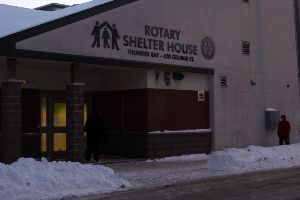THUNDER BAY -- Architects of a 24-hour effort to count the city's homeless population were overwhelmed by the response.
Thunder Bay's first-ever Point in Time survey and separate 20,000 Homes survey attracted a shocking response between Saturday and Sunday evenings.
“Between 6 p.m. (Saturday) and 11 p.m., we did over 200 surveys then. We only expected to get 200 for the whole 24-hour period and we got it then,” said Jacki Alto, the Point in Time coordinator for the Thunder Bay Indian Friendship Centre.
Those identifying as homeless were paid a $10 honorarium for completing the Point in Time survey and another $15 for the 20,000 Homes survey.
City Hall ran out of surveys on Sunday by 3 p.m. Shelter House and the friendship centre made more food and began printing more surveys when they ran out of money at 5 p.m.
One volunteer even bought coffee shop gift certificates to entice turnout in the count's final hours.
 The event that was billed as "the beginning of the end of homelessness in Thunder Bay" attracted over 100 volunteers who fanned out across the city, some driving through the night.
The event that was billed as "the beginning of the end of homelessness in Thunder Bay" attracted over 100 volunteers who fanned out across the city, some driving through the night.
They followed the Salvation Army soup vans, stationed in shelters, accessed prisons and health care facilities, and some helped the homeless complete surveys outdoors.
Alto said volunteers did not approach known homeless encampments out of respect for privacy, however. Although some volunteers were security in plainclothes, she pointed out there wasn't a single incidence of hostility.
Lakehead Social Planning Council social researcher and planner Bonnie Krysowaty was surprised at the turnout among under-housed individuals, who can be easily missed in homeless counts.
"We definitely will miss some people, as you do in a census, as you do in any data collection of that kind. But I do have to say we got a lot of people coming out that I didn't know were in Thunder Bay that were homeless. We did get a lot of couch surfers," she said.
"It was a lot greater than I assumed it would be in the beginning -- possibly 100 people more."
The Point in Time count will be tabulated over the coming days.
Although no further honoraria are available, the 20,000 Homes campaign will be stationed across the city throughout the week, registering homeless people through long-form surveys that will index them on a national scale.
That campaign is aiming to house 20,000 homeless Canadians by July of 2018.
By implementing the Housing First strategy among other social service changes, housing advocates aim to end long-term reliance on homeless shelters altogether.
"The real goal is to to make sure homelessness never becomes an epidemic or a problem again like it is right now where people are dying on the street," Krysowaty said.
"We have organizations sitting around the table already to start housing people that are in dire need and go through the list on the basis of vulnerability and offering supports to those people so they can be housed successfully."
